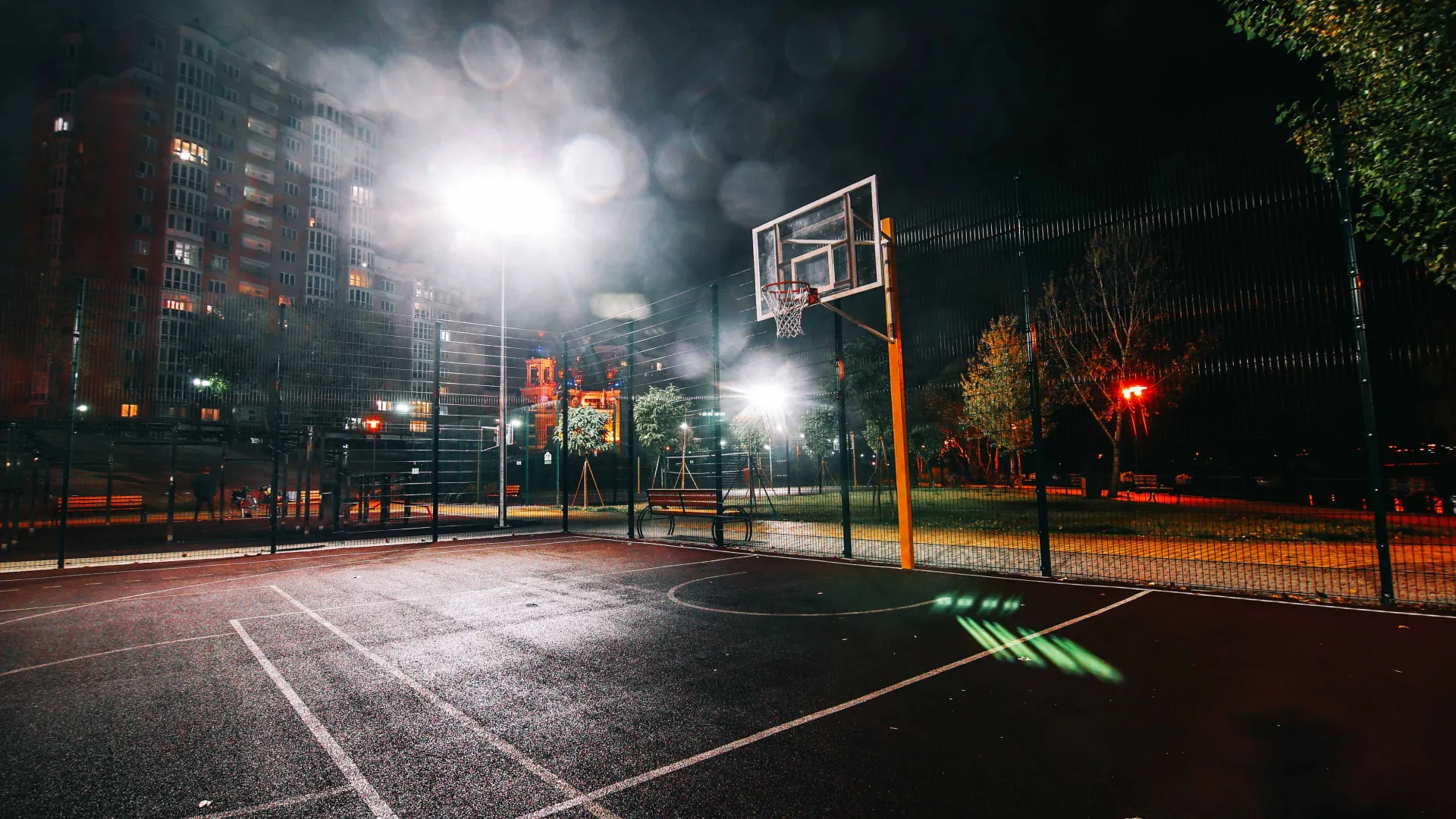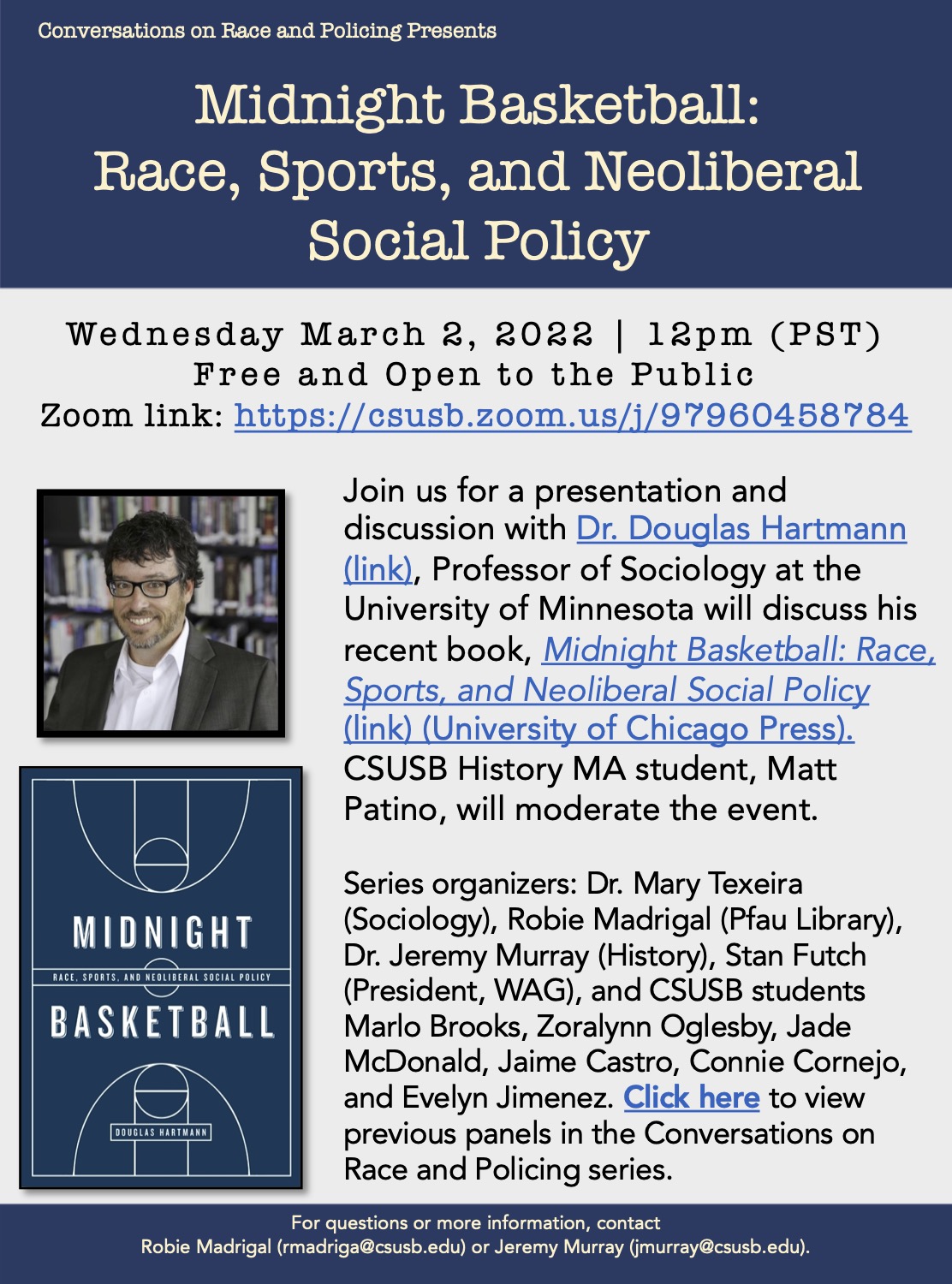Joe Gutierrez | CSUSB Office of Strategic Communication | (951) 236-4522 | joeg@csusb.edu

The creation in the 1980s and ’90s of midnight basketball leagues as meaningful social policy will be the focus of the next Conversations on Race and Policing when Douglas Hartmann, professor of sociology at the University of Minnesota, presents his talk.
“Midnight Basketball: Race, Sports, and Neoliberal Social Policy” will take place on Zoom at noon Wednesday, March 2. It is open to the public and can be accessed from a PC, Mac, Linux, iOS or Android at https://csusb.zoom.us/j/97960458784.
The program takes its name from Hartmann’s 2016 book that examined “the audacious notion that organizing young men to run around in the wee hours of the night—all trying to throw a leather ball through a metal hoop—could constitute meaningful social policy,” the book’s website says.
The book’s synopsis goes on, “Organized in the 1980s and ’90s by dozens of American cities, late-night basketball leagues were designed for social intervention, risk reduction, and crime prevention targeted at African American youth and young men. In ‘Midnight Basketball,’ Hartmann traces the history of the program and the policy transformations of the period, while exploring the racial ideologies, cultural tensions, and institutional realities that shaped the entire field of sports-based social policy. Drawing on extensive fieldwork, the book also brings to life the actual, on-the-ground practices of midnight basketball programs and the young men that the programs intended to serve. In the process, Midnight Basketball offers a more grounded and nuanced understanding of the intricate ways sports, race, and risk intersect and interact in urban America.”
Conversations on Race and Policing, also known as CoRP, began in the aftermath of the May 25, 2020, death of George Floyd while in the custody of four Minneapolis, Minn., police officers. A video of the incident posted on social media led to widespread protests, the firing of four police officers, the arrest and conviction of one officer on a second-degree murder and related charges, the other three on charges of aiding and abetting second-degree murder – and a spotlight worldwide on race and policing.
The series has featured scholars, journalists, law enforcement officers, lawyers, activists, artists, educators, administrators and others from throughout the nation who shared their experience and expertise on issues related to race and policing.
More than 50 forums have taken place, and video recordings of the sessions are posted online on the Conversations on Race and Policing Lecture Series Archive.
The next scheduled Conversations on Race and Policing, each at noon on Wednesdays, are:
- March 9: “Everyday Violence against Black and Latinx LGBT Communities,” presented by Siobhan Brooks, professor of African American Studies at Cal State Fullerton;
- April 13: “Dr. Zachary Powell on Consent Decrees,” presented by Zachary Powell, CSUSB assistant professor of criminal justice; and
- April 27: “Presumed Guilty: How the Supreme Court Empowered the Police and Subverted Civil Rights,” presented by Erwin Chemerinsky, Dean of Berkeley Law, and Jesse H. Choper Distinguished Professor of Law at the University of California, Berkeley.
The series is organized by CSUSB students Marlo Brooks, Zoralynn Oglesby, Evelyn Jimenez, Jade McDonald, Jaime Castro and Connie Cornejo; Mary Texeira, CSUSB professor of sociology; Jeremy Murray, CSUSB associate professor of history; Robie Madrigal, public affairs/communication specialist for the CSUSB John M. Pfau Library; and community member Stan Futch, president of the Westside Action Group.
For more information, contact Robie Madrigal at rmadriga@csusb.edu or Jeremy Murray at jmurray@csusb.edu.
Also, visit the Conversations on Race and Policing webpage.
